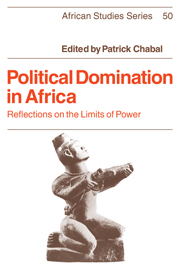Book contents
- Frontmatter
- Contents
- Acknowledgements
- Introduction: Thinking about politics in Africa
- 1 Democracy in Africa
- 2 Politics and vision in Africa: the interplay of domination, equality and liberty
- 3 Democracy and ethnocentrism
- 4 Wails and whispers: the people's voice in West African Muslim politics
- 5 Revolutionary democracy in Africa: the case of Guinea-Bissau
- 6 Civil society in Africa
- 7 Political accountability in African history
- 8 The politics of representation and good government in post-colonial Africa
- Notes
- Index
8 - The politics of representation and good government in post-colonial Africa
Published online by Cambridge University Press: 26 January 2010
- Frontmatter
- Contents
- Acknowledgements
- Introduction: Thinking about politics in Africa
- 1 Democracy in Africa
- 2 Politics and vision in Africa: the interplay of domination, equality and liberty
- 3 Democracy and ethnocentrism
- 4 Wails and whispers: the people's voice in West African Muslim politics
- 5 Revolutionary democracy in Africa: the case of Guinea-Bissau
- 6 Civil society in Africa
- 7 Political accountability in African history
- 8 The politics of representation and good government in post-colonial Africa
- Notes
- Index
Summary
Lorsque les hommes qui disposent des destinées de la terre se trompent sur ce qui est possible, c'est un grand mal.
Benjamin Constant, De l'Esprit de Conquite et de l'Usurpation, in Oeuvres, ed. A. Roulin (Paris; Gallimard, 1957), p. 955There are at least two perspectives in which it is both natural and appropriate to consider the political character of African states. The first is the retrospective perspective of causal explanation. The second is the partially retrospective, but always also at least partly forward-looking, perspective of political appraisal. The former is firmly a perspective of theoretical reason; the latter, equally firmly, a perspective of practical reason. Much of the history of Western philosophy has been devoted to the more or less forlorn effort to establish quite how in the last instance the two relate to one another. Unsurprisingly, understanding of the politics of modern Africa, like understanding of the politics of virtually everywhere else at virtually all times, has been bedevilled by a failure to distinguish these two perspectives and to retain a clear grasp of the distinction.
It is scarcely open to serious dispute any longer that the bulk of the political history of post-war Africa has been profoundly discouraging. It has been discouraging to those who favour democracy, or any system of robustly institutionalised political accountability. But it has been little, if any, more encouraging to those who would be more than content, in the absence of such a system, with simply a steady and dependable improvement in the living conditions of the great majority of Africa's populations.
- Type
- Chapter
- Information
- Political Domination in Africa , pp. 158 - 174Publisher: Cambridge University PressPrint publication year: 1986
- 7
- Cited by



